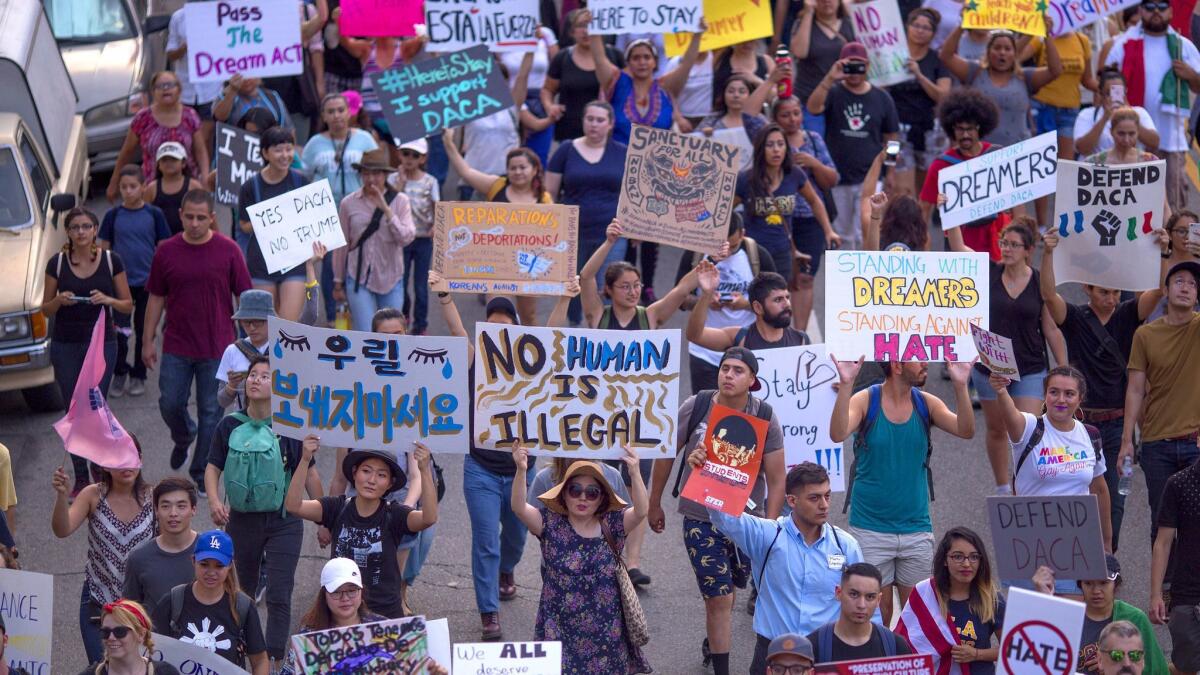L.A. County curbs employee travel to anti-DACA states and urges legal action following Trump’s decision to end program

- Share via
The Los Angeles County Board of Supervisors approved several motions Tuesday aimed at countering the Trump administration’s decision last week to end an Obama-era program that granted young immigrants who were brought to the U.S. illegally as children a temporary reprieve from deportation.
The Deferred Action for Childhood Arrivals program, or DACA, will end in six months unless Congress takes legislative action.
The primary motion considered Tuesday, introduced by Supervisors Hilda Solis and Janice Hahn, directed county officials to send a letter to Congress and President Trump denouncing the rescission of DACA, as well as a letter to Gov. Jerry Brown and state Atty. Gen. Xavier Becerra urging legal action to protect California’s DACA recipients.
The motion also put in place a one-year travel restriction for county employees on official business to the nine states that threatened legal action if the Trump administration did not end DACA: Alabama, Arkansas, Idaho, Kansas, Louisiana, Nebraska, South Carolina, Texas and West Virginia. It includes exceptions, however, for travel related to emergency response and assistance, child protection and public safety.
“Travel restrictions [are] a way of boycotting policies adopted in other jurisdictions,” Solis said. “And they are legal.”
The motion directs the county’s recently established Office of Immigrant Affairs to conduct outreach to current DACA recipients and to assist them with their renewal applications, as well as to explore forms of relief that may be available to county employees who are DACA recipients — including one member of Hahn’s staff.
An additional motion, introduced by board Chairman Mark Ridley-Thomas, directs the county to join or file friend-of-the-court briefs in lawsuits challenging the administration’s decision to end DACA, including one filed by Becerra on Monday.
A third motion calls on the Board of Supervisors to elevate immigration to the level of a specific board priority, alongside justice reform, child protection, health integration, homelessness and environmental oversight.
“Identifying immigration as a priority for L.A. County will ensure our focus on legislation, litigation, resources and services remains concentrated and consistent,” Solis said.
All three motions passed, though some along divided lines. Supervisor Kathryn Barger voted against the travel restriction and support for legal action against the administration, while Ridley-Thomas abstained from voting on the travel restriction.
“I support the DACA program as originally intended,” Barger said, noting that the measure was not a law but a short-term measure to grant temporary relief while Congress worked out a long-term fix.
“We need to push as hard as we can” for immigration reform in Congress, Barger said. “By not taking action over the past five years, all we’ve done is keep these young people in limbo.”
About two dozen people spoke in support of the motions. Many of them thanked Solis and Hahn, and described how DACA recipients have been able to “come out of the shadows,” work, go to school and become productive members of society.
“These young men and women are contributing mightily to our L.A. economy,” said David Rattray of the L.A. Area Chamber of Commerce.
Rattray and others cited figures from the left-leaning Center for American Progress that estimated that eliminating DACA would mean the loss of $460 billion in gross domestic product and nearly $25 billion in Social Security and Medicare contributions over the next decade.
Hugo Romero, a project manager at the UCLA Labor Center and DACA recipient, said DACA had enabled thousands of young people like himself to work in skilled jobs after college, to avoid exploitation in the workplace and to stop living in fear.
Romero said he knew personally what that was like, recalling when he worked at a car wash before receiving DACA. “We should refuse to go back to those days,” he said.
Twitter: @AgrawalNina
More to Read
Sign up for Essential California
The most important California stories and recommendations in your inbox every morning.
You may occasionally receive promotional content from the Los Angeles Times.











